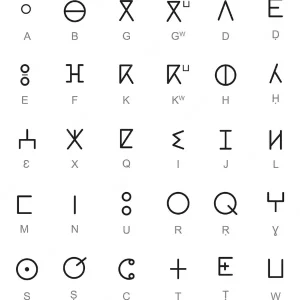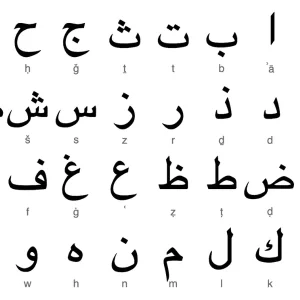Moroccan Language: Unraveling the Rich Tapestry of Morocco's Linguistic Heritage
Moroccan Language the Rich Tapestry of Morocco's Linguistic Heritage
Introduction
We cordially invite you to explore the fascinating world of Moroccan, a language whose rich cultural legacy is reflected in its linguistic tapestry. Moroccan language provides a window into the spirit and heart of this lively North African nation, displaying influences from old Berber cultures as well as modern Arabic idioms. We shall go deeply into the nuances of the Moroccan language in this essay, examining its history, traits, and significance in Moroccan culture. Join us as we appreciate the richness and beauty of the Moroccan language as we embark on this enthralling linguistic adventure.
1. A Historical Perspective
The Berber groups that once lived in North Africa have a rich history that can be traced back to the origins of the Moroccan language. The Tamazight dialect of the Berber language serves as the foundation for contemporary Moroccan. Many different civilizations have had an impact on Morocco throughout the years, including the Phoenicians, Romans, Vandals, and Arabs, all of which have left their stamp on the country’s linguistic environment.
2. The Linguistic Diversity of Morocco
One of the distinctive characteristics of Morocco is its linguistic variety. Several different dialects persist inside the nation’s boundaries, despite Modern Standard Arabic being the official language. Each of these regional dialects gives the Moroccan language a distinctive character and varies from area to region. Darija, Tashelhit, and Tarifit are a few notable Moroccan dialects that are each spoken by a separate ethnic group.
3. Exploring Darija: The Everyday Language
Darija is the most widely spoken Moroccan dialect and serves as the lingua franca among Moroccans. It is an amalgamation of Arabic, Berber, French, and Spanish influences. The casual and colloquial nature of Darija makes it an essential tool for effective communication in Morocco’s day-to-day life.
4. Unraveling the Beauty of Tamazight
Berber, also known as Tamazight, has a distinct position in Moroccan linguistic history. Tamazight symbolizes the old Berber culture and tradition as one of the native languages. Tamazight preservation and promotion activities have gained steam in recent years despite obstacles, highlighting the language’s importance to Moroccan identity.
5. The Impact of French and Spanish
Both French and Spanish have a strong presence in the linguistic fabric of Morocco as a result of the colonial heritage of the nation. Particularly in the fields of education, administration, and industry, French continues to be a vital language. The northern parts of the nation, however, are rule by Spanish.
6. The Influence of Arabic: Fusha vs. Dialects
Moroccan society is fundamentally based on Arabic, which is both a classical and an official language. Fusha, or Modern Standard Arabic, is utilize in official contexts including the media, the classroom, and religious rituals. A native dialect and a colloquial variety of Arabic combine to create the distinctively Moroccan language spoken by Moroccans.
7. Morocco's Multilingual Society: Embracing Diversity
Moroccan society, which is bilingual, encourages tolerance and sensitivity toward other cultures. Moroccans are able to move between languages with ease, demonstrating their flexibility and respect for linguistic variety. Morocco has become a friendly location for tourists from all over the world because to its capacity to interact in several languages.
8. The Role of Moroccan Language in Arts and Literature
Throughout history, poets, authors, and painters have drawn inspiration from the Moroccan language. The Moroccan language has been used as a vehicle for creative expression, reflecting the country’s goals, dreams, and challenges, from classical Berber poetry to modern Arabic literature.
9. The Connection Between Language and Identity
Individual and societal identities are significantly shaped by language. Morocco’s linguistic diversity reflects the cohabitation of several ethnic groups and the nation’s cosmopolitan heritage. One’s language may frequently be used as a sign of one’s cultural origin and heritage, promoting a sense of pride and belonging.
10. Preserving Moroccan Language: Challenges and Solutions
The Moroccan language suffers difficulties in the current day, just like many other languages throughout the world. Local dialects and native tongues are in danger of extinction due to globalization and the dominance of dominant languages. Nevertheless, a number of activities, such as educational projects and cultural gatherings, are aimed towards preserving Morocco’s linguistic history.
11. The Significance of Moroccan Language in Education
Any language’s development and preservation rest on the fundamental tenet of education. The importance of language in Morocco’s educational system cannot be overstated. French and Arabic are taught in schools, and there are growing initiatives to include Tamazight in the curriculum due to its cultural significance.
12. Moroccan Language and Business
Language acts as a bridge between cultures in the business world. International companies and investors are drawn to Morocco by its multilingual workforce, which is fluent in Arabic, French, and frequently English as well. Strong commercial relationships are cultivated and doors to new prospects are opened by the capacity to communicate in many languages.
13. The Power of Moroccan Proverbs
Moroccan proverbs are full of color and illustrate the humor and wisdom of the people of the country. These proverbs, which are frequently passed down through generations, are widely used in everyday discussions because they provide insightful commentary on Moroccan society and useful life lessons.
14. Moroccan Language in the Digital Age
For the Moroccan language, the digital era has offered both possibilities and disadvantages. The internet offers a venue for language lovers and students to interact, exchange knowledge, and advance linguistic variety. Additionally, social media sites influence language patterns and promote linguistic innovation.
15. Language as a Catalyst for Unity
People from many origins are brought together by the uniting power of the Moroccan language, which dissolves borders. Language becomes a potent instrument to fill gaps and promote understanding in a nation known for its diverse cultural heritage.
FAQs
Q1: Is Moroccan Arabic the same as Modern Standard Arabic?
- They aren’t the same, no. In contrast to Modern Standard Arabic (Fusha), which is the formal and classical form used in writing and formal situations, Moroccan Arabic, also known as Darija, is a colloquial variety of Arabic with influences from various languages.
Q2: How many languages are spoken in Morocco?
- Speaking Arabic (Fusha and its dialects), Berber (Tamazight), French, and Spanish, Morocco is a multilingual nation.
Q3: Can I get by in Morocco with just English?
- Although English is not as extensively spoken as French or Spanish, you can still get by with some basic English in tourist regions and large towns. For a more authentic experience, it is useful to master a few basic Darija sentences.
Q4: Is Tamazight still spoken in Morocco?
- The usage of Tamazight is still prevalent in Morocco, particularly in rural and Berber areas. Initiatives to defend and advance Tamazight have gained traction recently.
Q5: What role does language play in Moroccan cultural identity?
- Moroccan culture is significantly by language, which represents the country’s heterogeneous background and acts as a symbol of both individual and group identity.
Conclusion
In summary, the Moroccan language is a rich tapestry fashion from threads of variety, history, and culture. The Moroccan language is a perfect example of the country’s distinctive personality, from its ancient Berber beginnings to the present influences of French and Spanish. This linguistic mosaic unifies Moroccans from all backgrounds, encouraging a sense of solidarity and honoring the nation’s rich legacy. In order to protect the essence of Morocco’s unique linguistic history, it is crucial to preserve and promote the Moroccan language as we traverse the potential and challenges of the digital era.
Moroccan Language: Unraveling the Rich Tapestry of Morocco's Linguistic Heritage


Unraveling the Rich Tapestry of Morocco's Linguistic Heritage
Note : If you need a city Tour or a trip Let us know, The Tour Can be Customized Depending on your Needs ( Time , Dates , pick up and drop off locations…ect)
Whether you’re traveling as a couple, a small group of friends or family, whether you crave history, adventure, culinary delights or a peaceful getaway, we can help you create the dream holiday at your dream destination. Contact us
